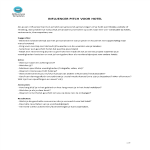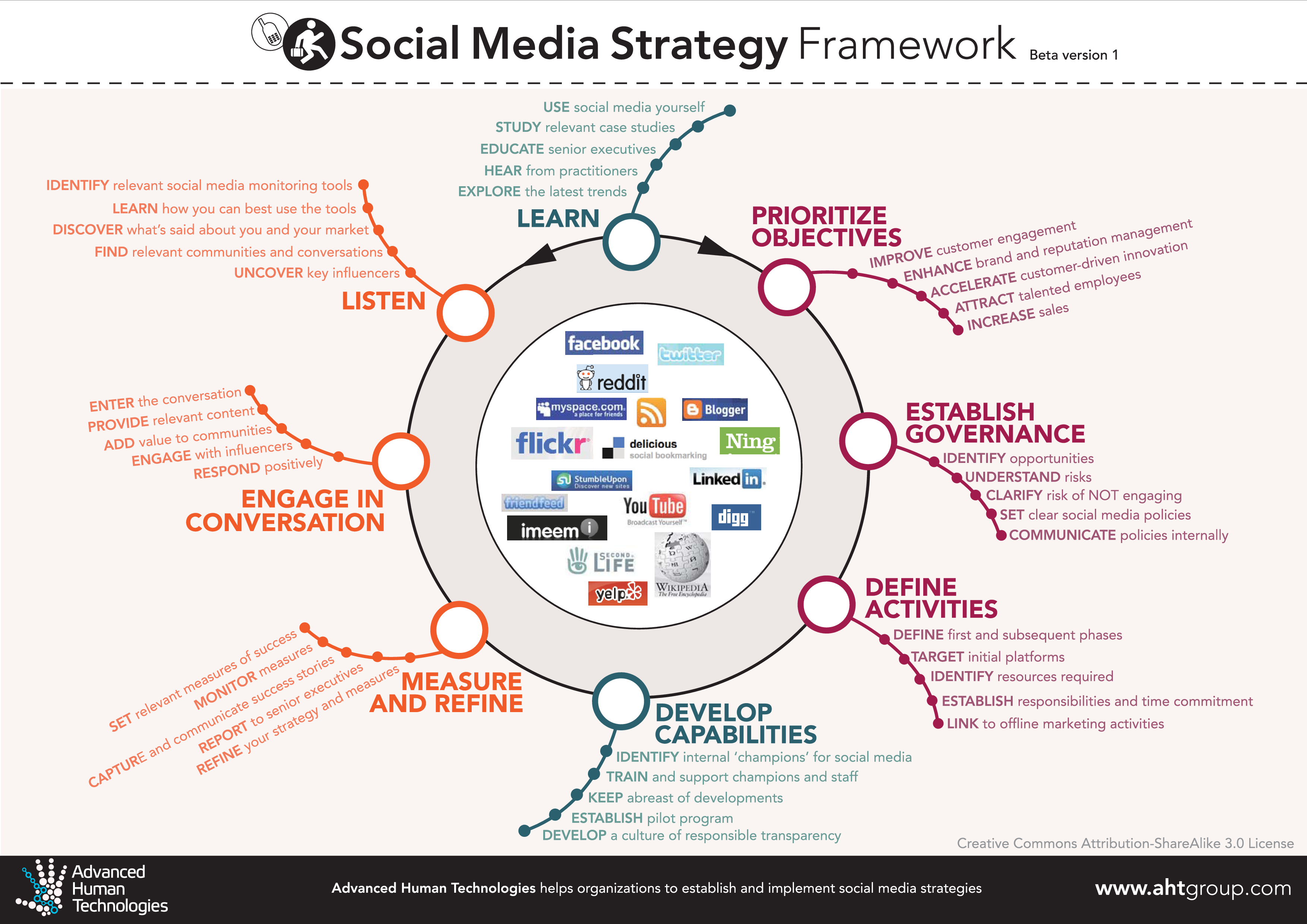Social Media Strategy Framework Poster
Save, fill-In The Blanks, Print, Done!

Download Social Media Strategy Framework Poster
Adobe Acrobat (.pdf)- This Document Has Been Certified by a Professional
- 100% customizable
- This is a digital download (265.67 kB)
- Language: English
- We recommend downloading this file onto your computer.
Why is there a need for a social media framework? What is the best way to create a social media framework?
Our social media framework template includes everything you need to create a successful social media strategy. Just download it and start planning your next move! Download this professional Social Media Strategy Framework Poster template now!
A social media strategy framework is a structured and comprehensive plan that outlines an organization's approach to using social media to achieve its goals and objectives. It serves as a guiding framework to systematically plan, implement, monitor, and measure the impact of social media activities. A well-developed social media strategy framework helps ensure that an organization's efforts on social platforms are purposeful, cohesive, and aligned with its overall business objectives. While the specifics of a social media strategy may vary from one organization to another, a typical framework includes the following components:
- Goals and Objectives:
- Start by defining clear and measurable goals that your organization aims to achieve through social media. These goals should align with your overall business objectives.
- Objectives should be specific, measurable, achievable, relevant, and time-bound (SMART).
- Target Audience and Personas:
- Identify and describe your target audience or customer segments.
- Create customer personas to gain a deeper understanding of your audience's demographics, interests, needs, and behaviors.
- Platform Selection:
- Determine which social media platforms are most relevant to your target audience and business niche.
- Tailor your content and strategy to suit the specific platforms chosen.
- Content Strategy:
- Plan the type of content you will create and share, including text, images, videos, and other formats.
- Define the content themes and topics that align with your brand and resonate with your audience.
- Content Calendar:
- Create a content calendar to schedule when and how often you will post content on each social media platform.
- Ensure a consistent posting schedule to maintain audience engagement.
- Engagement and Interaction:
- Outline how your organization will engage with the audience, respond to comments and messages, and participate in conversations.
- Define your tone and voice for consistent brand representation.
- Paid Advertising and Promotion:
- Determine your budget and strategy for paid social media advertising if applicable.
- Set clear objectives for paid promotions, such as increasing website traffic, lead generation, or sales.
- Monitoring and Analytics:
- Identify the key performance indicators (KPIs) you will use to measure the success of your social media efforts, such as reach, engagement, conversions, or return on investment (ROI).
- Use social media analytics tools to track and analyze performance and adjust your strategy as needed.
- Crisis Management and Guidelines:
- Develop a plan for handling potential social media crises or negative feedback.
- Establish guidelines for employees and community managers who manage social media accounts.
- Compliance and Legal Considerations:
- Ensure that your social media activities adhere to legal and regulatory guidelines relevant to your industry.
- Outline the use of disclaimers, copyrights, and data privacy.
- Team and Roles:
- Define the roles and responsibilities of team members involved in executing the social media strategy.
- Establish a workflow for content creation, review, and posting.
- Budget and Resources:
- Specify the budget and resources allocated for social media efforts, including tools, software, and personnel.
- Consider training and development for team members.
- Performance Review and Reporting:
- Set a schedule for regular performance reviews and reporting on social media activities.
- Use data and insights to make data-driven decisions and optimize your strategy.
A social media strategy framework provides structure and guidance for your organization's social media activities. It helps ensure that your efforts are strategic, data-driven, and aligned with your business objectives, ultimately contributing to your organization's success in the digital landscape
Download this Social Media Strategy Framework Poster template now and enhance your business!
Do you need more information? AllBusinessTemplates.com provides many kinds of legal and business templates in the range of IT, Environmental, Startups, Marketing, Sales, Procurement, Law, Notary, Finance, HR, Auction, Logistics, Transportation, Maintenance Services, etc. Just search on our website and have instant access to thousands of free and premium business document templates, forms, letters, reports, plans, and resumes used by professionals in your industry. All business templates are easy to find, crafted by professionals, ready to use, easy to customize and intuitive.
DISCLAIMER
Nothing on this site shall be considered legal advice and no attorney-client relationship is established.
Leave a Reply. If you have any questions or remarks, feel free to post them below.
Influencer Marketing Templates
What makes a good influencer? Check out our effective and useful Influencer Marketing Templates here!
Read moreRelated templates
Latest templates
Latest topics
- Excel Templates
Where do I find templates for Excel? How do I create a template in Excel? Check these editable and printable Excel Templates and download them directly! - GDPR Compliance Templates
What do you need to become GDPR compliant? Are you looking for useful GDPR document templates to make you compliant? All these compliance documents will be available to download instantly... - Google Docs Templates
How to create documents in Google Docs? We provide Google Docs compatible template and these are the reasons why it's useful to work with Google Docs... - IT Security Standards Kit
What are IT Security Standards? Check out our collection of this newly updated IT Security Kit Standard templates, including policies, controls, processes, checklists, procedures and other documents. - Letter Format
How to format a letter? Here is a brief overview of common letter formats and templates in USA and UK and get inspirited immediately!
cheese



